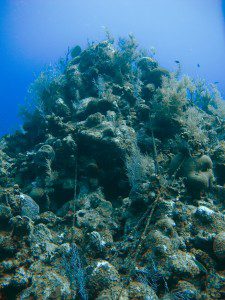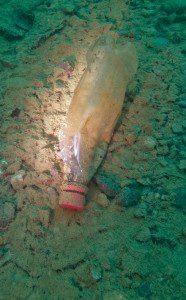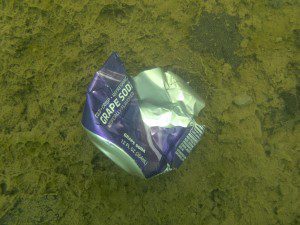
“Out of sight, out of mind.” This cliché is true for a lot of things. Something might be vitally important to us, but the moment we set it down, and walk away, we forget where we left it. Like that cup of coffee this morning. Or your car keys.
Just because something is out of your mind, doesn’t mean it’s not there anymore or is no longer a problem. For years, our oceans have been a dumping ground for the things we don’t want to see any more.
The problem is that junk that we’ve thrown into the ocean just stays there. Or it floats. And it kills birds or turtles, porpoises and whales who get tangled in it.
When I dive, I often pick up trash that hasn’t been down too long. When I was diving in Grand Cayman recently, I spotted an empty tuna can and tucked into my BCD to bring it to the surface, for example.  I know lots of divers who do that. On the other hand, if fishing line is entangled in a reef, you’ll do more damage by pulling it lose than leaving it in place. A can or a bottle that has been on the bottom for a while might have something living in it. In the local lake where I learned to dive, and many divers explore every day in the summer, I often see beer cans, plastic cups and other debris on the bottom.
I know lots of divers who do that. On the other hand, if fishing line is entangled in a reef, you’ll do more damage by pulling it lose than leaving it in place. A can or a bottle that has been on the bottom for a while might have something living in it. In the local lake where I learned to dive, and many divers explore every day in the summer, I often see beer cans, plastic cups and other debris on the bottom.
Today, most of us who grew up with the crying native American standing beside the road from the Keep America Beautiful commercial get angry when we see litter by the side of the road where some inconsiderate, selfish slob has thrown it from their car. We need to have that same reaction when we see trash in the ocean. National Geographic reported earlier this year that eight million tons of plastic trash is dumped into the ocean every year.
You might have heard of the floating garbage dump in the North Pacific, but did you know there are actually five floating gyres of plastic and trash?
What you can do
1) Look for alternative materials or avoid excessive packaging when deciding on purchases. Use paper bags, milk and juice in cardboard, and cloth diapers. Insist on paper bags and glass bottles.
2) Recycle. Many communities currently offer pick-up recycling programs for #1 and #2 plastics. Other forms of plastic may be accepted by a local recycling business. If your community doesn’t have a recycling program, contact your city or town hall to request one.
3) Educate others about the problem of marine debris, enhancing “voluntary compliance through awareness.”
4) Get involved. Locate or start a cleanup in your area.
From the Woods Hole Oceanographic Institute
PADI’s Project Aware is organizing the Beneath the Waves drive for divers to share their photos of underwater debris on Instagram and Twitter with the hashtag #BeneathTheWaves leading up to the Our Ocean 2015 conference on October 5 and 6.
Divers, it’s time to do more than picking up a piece of trash or two and bringing it to the surface. Show the world what you see. Maybe then, it won’t be out of sight any longer.